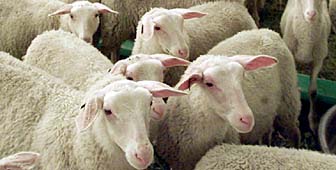Ritual slaughter gives Swiss food for thought

The battle lines are being drawn up in what promises to be an emotionally charged debate over the ritual slaughter of animals in Switzerland.
At issue is the government’s plan to lift a ban on ritual slaughter — the bleeding to death of animals without first stunning them. The method is used to produce kosher and halal meat.
Animal rights groups are outraged. Swiss Animal Protection (PSA) has responded by launching an initiative covering a range of issues, the most provocative of which is the retention of the ban on ritual slaughter, something it considers to be an “archaic form of torture”.
The PSA has acted even before the national consultation process has finished and parliament has debated the government’s proposals. It will now probably be a number of years before there can be any change in the law.
“The stress and anxiety an animal experiences when it is bled to death without being rendered unconscious are measurable. And it is scientifically proven that it suffers more than an animal that has been stunned,” says Alain Zwygart, vice-president of Swiss Animal Protection.
However, that is contested by supporters of ritual slaughter. They say giving the animal an electric shock to knock it out also causes pain. They also insist that if ritual slaughter is performed properly, brain activity stops almost immediately.
No scientific consensus
In fact there appears to be no scientific consensus on which method causes the least pain for the animal. “The results are really contradictory,” says Alfred Donath, president of the Swiss Federation of Jewish Communities and a retired doctor.
The holy books of Judaism and Islam – the Talmud and the Koran – say that man should not consume blood, and that the animal should be in good health and alive when bled. In bleeding the animals, all of the impurities are expelled from its body, it is believed.
A recent legal opinion on the matter – conducted for the Federal Veterinary Office – complicated the debate by stating that neither the Talmud nor the Koran expressly forbade the stunning of animals before slaughter. That may be the case, but Donath says Jewish tradition dictates that the animal should be conscious.
“If you use a pistol to stun the animal, it destroys brain cells, and this is already a reason for not declaring the animal healthy and therefore kosher,” Donath told swisisnfo.
Minimum of suffering
The Muslim community is more flexible. A halal abattoir exists in canton Geneva, and the imams have decided that a light stun, which knocks the animal out for just a few seconds but does no permanent damage, is permitted.
“Ritual slaughter has to take into account the well-being of the animal – that is part of our Muslim principles. We want the slaughter to happen with a minimum of suffering and that might mean, in certain cases, stunning it before slaughter,” says Hafid Ouardiri, head of Geneva’s Islamic Cultural Centre.
“Those who seek to protect animals have a point, as do those who want to defend their traditions. I believe it’s possible to reconcile the protection of animals with ritual slaughter,” he told swissinfo.
The PSA initiative goes further than merely wanting to retain the ban on ritual slaughter. It also seeks to ban the importation of any meat – whether kosher or halal meat, or meat and eggs from battery hens – that has been produced with methods that are forbidden in Switzerland.
Swiss standards
“We believe it’s hypocritical to allow in meat that doesn’t come up to the standards that Swiss farmers have to meet,” Zwygart says.
Alfred Donath estimates about a quarter of Switzerland’s Jewish community – around 4,000 people – eats only kosher meat, even if everyone eats it at large family gatherings. Currently they get their kosher meat from an abattoir in the French city of Besançon. But if this were not allowed into Switzerland, it could have a dramatic impact in the Jewish community.
“We would have three options: either we no longer respect our beliefs; or we all become vegetarians; or we leave Switzerland,” Donath says.
He points out that there are a number of kosher restaurants and hotels in Switzerland who serve the many foreign Jews who come to Switzerland on holiday.
Adapting customs
Alain Zwygart is not sympathetic. He believes the number of Jews who eat kosher meat in Switzerland is too small to justify reintroducing ritual slaughter: “The different communities have to understand the problem and perhaps adapt their customs accordingly,” he says
“I don’t believe freedom of religion is less important than the rights of animals. But the freedom of religion should have limits that must not be passed,” he adds.
The law banning ritual slaughter is over 100 years old. But its approval by the Swiss people at the end of the 19th century had more to do with anti-Semitism and keeping Jews from Eastern Europe out of Switzerland than any concern for the welfare of animals.
Times may have changed but there is a very real fear that the initiative may be hijacked by racist elements to attack the Muslim and Jewish communities.
“I am concerned that the defence of animals might be used not just to eliminate suffering, but to oppose everything we hold sacred,” Ouardiri said.
by Roy Probert

In compliance with the JTI standards
More: SWI swissinfo.ch certified by the Journalism Trust Initiative
You can find an overview of ongoing debates with our journalists here. Please join us!
If you want to start a conversation about a topic raised in this article or want to report factual errors, email us at english@swissinfo.ch.